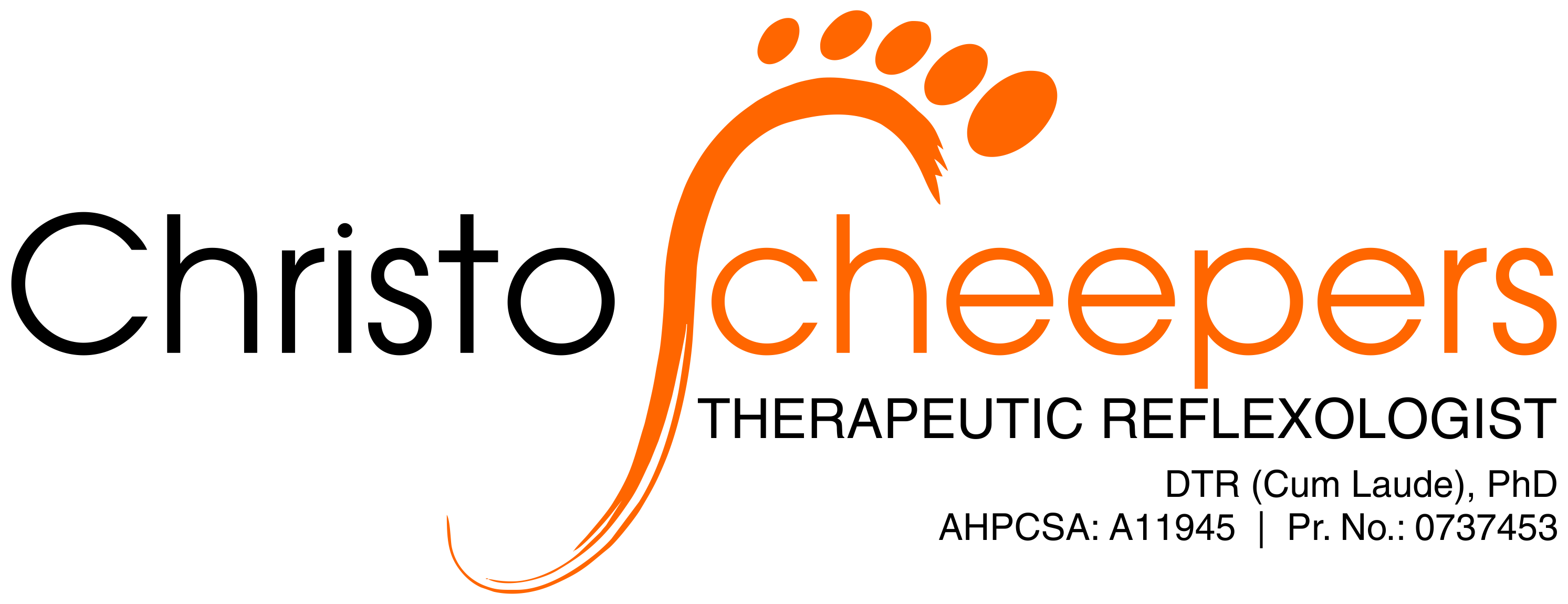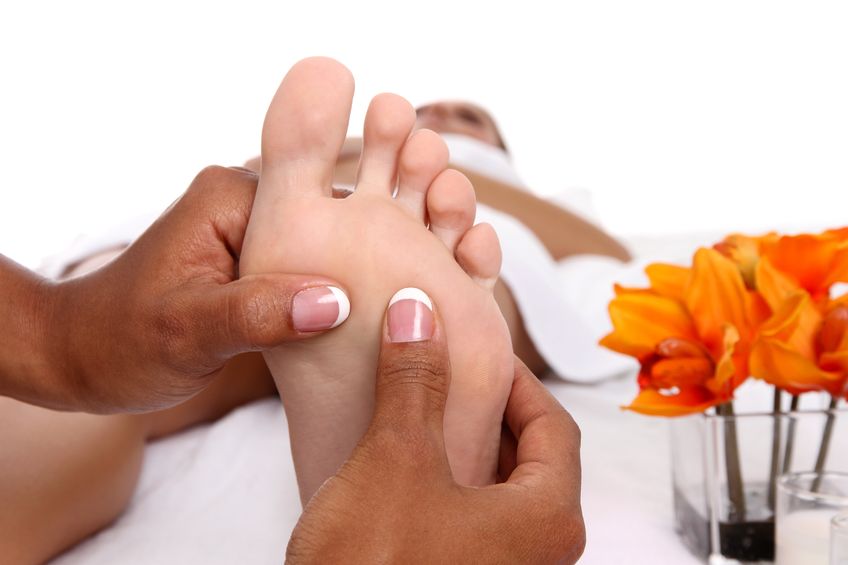In today’s post, we’ll consider burnout and how Therapeutic Reflexology may impact on this specific aspect of mental health, but also the impact on the accompanying physical health aspects.
The WHO (2025) does not classify burnout as a “medical condition”, but rather as an “occupational phenomenon”. Rightly so, because burnout is usually caused by continuous stress in the workplace, resulting in chronic fatigue, lack of energy, decreased productivity, and accompanying unhappiness and negativity about your profession and your workplace (Riethof & Bob, 2019; WHO, 2025).
Burnout is not something we tend to talk about, because we live in a culture where it is almost frowned upon if you are not constantly busy-busy-busy. Society, and especially the workplace, expects of us to be busy all the time, almost as if busyness is equated to productivity. The problem is that being busy, does not mean that you are productive, it merely means that you are occupying your time with activities that may not lead to any form of productivity.
So, you may be wondering if you are experiencing burnout? Ask yourself the following questions (created from content from Smith and Sheldon, 2025) and it may give you an indication of your burnout levels:
- Do I feel emotionally drained?
- Do I constantly feel physically tired and without energy?
- Do I feel helpless in the workplace?
- Do I feel hopeless in the workplace?
- Do I feel cynical about life in general, but specifically about my work?
- Do I feel restless?
- Do I feel like a failure?
- Do I feel defeated?
- Do I feel trapped?
- Do I experience self-doubt?
- Do I feel isolated and all alone?
- Do I feel a lack of motivation?
- Do I feel that I have nothing to offer?
- Do you dread going to work?
- Do I feel that my work is negatively impacting my personal life, home life and social life?
- Do I get regular colds and flus, or other recurring illness conditions?
- Do I feel that every day is going to be a bad day?
- Do I feel like my work is a waste of my energy?
- Do I feel that my home life or relationships are a waste of my energy?
- Do I constantly feel overwhelmed?
- Do I constantly spend my time with activities numbing my mind from reality?
- Do I often feel unappreciated?
- Do I feel that nothing I do makes a difference?
If answering yes on multiple of these questions, you may be experiencing signs of burnout, or the onset of the first signs of potential burnout. Further signs may be when you begin to withdraw from others and become isolated and constantly procrastinating instead of completing tasks, while looking for every possible excuse not to go to work or to leave work when you are there (Smith & Sheldon, 2025).
Living with burnout is not fun. Not enjoying life, is not fun. Feeling continuously without any energy, is not fun.
So, let’s ask the obvious question: Why are you experiencing burnout?
No, I am not asking why you are experiencing prolonged stress at work, that is often part of certain professions that you cannot avoid. I am asking, why you are feeling the need to be pushed to the point of experiencing burnout? Why are you not putting boundaries in place to avoid burnout?
That is the deeper question: What is the underlying cause of your burnout?
Is it perhaps that you feel that you need to please everybody, especially your employer and therefore you cannot say “no” when asked to do something and as a result you overburden yourself with tasks? Is it perhaps because you feel that the sense of accomplishment you will experience when pushing through the extended periods of stress and being overburdened will be worth it because you will hopefully get the acknowledgement you are longing for? Is it perhaps that you have been retrenched previously and, in your attempt, to avoid going through the same trauma, you think you must work yourself to the bone just to show you are worthy to remain in the organisation and not be replaced again? Is it perhaps because you are experiencing personal problems or relationship problems or spousal problems and as a result you give yourself over to work to avoid facing the problems in your personal life head on?
These are a few questions to consider, but perhaps, take some time and really think through what it is that is fuelling reason for your burnout. Establishing the root cause, can usually be the first step in relooking what it is that we are doing in life, and at work.
Healthy boundaries may be the obvious first step to avoid burnout, but if you feel that you are not able to put these boundaries in place, then your stress will just continue.
Some people have personalities that are prone to result in constantly being busy with work and often relaxation is seen as a reason to feel guilty and as if you are not being productive as if you are a machine and not worthy to take some time to relax.
Smith and Sheldon (2025) mentions the three R’s as the way to deal with burnout, namely,
Recognise when burnout is eyeing you; Reverse the burnout by seeking professional assistance and reducing stress levels; and increase your Resilience to better deal with stress.
I would like to add a fourth R, namely Reflexology.
Therapeutic Reflexology is an ideal healthcare modality offering you some time for yourself while you are not only experiencing a healthy form of touch, in other words, a healthy way to connect with somebody else, but also reducing your stress levels in the form of a valuable therapy known to manage stress levels.
Let’s consider this for a moment. When you are experiencing prolonged stress in your life, your body keeps on excreting adrenaline and cortisol which puts your body in fight-or-flight mode. When your stress levels do not decrease to put the body in rest-and-digest mode, what happens is that you keep on using your energy as if you are either going to fight an opponent or run away from this opponent. You do not have a physical opponent threatening you, but prolonged stress is like an emotional opponent constantly draining you from your energy as your mind is constantly in a state of fight-or-flight. However, your body is also in that state as it keeps on excreting adrenaline and cortisol and you remain in this heightened state of stress resulting in not only the emotional exhaustion you are experiencing, but also a physical exhaustion. If you remain in this state, you are fuelling the burnout and accompanying symptoms.
As you work through the root cause of burnout in your life and you reconsider your life and the way forward, why not consider getting Therapeutic Reflexology sessions to assist you to rebalance your body and mind into a state of homeostasis?
Therapeutic Reflexology is one of the best forms of stress relief available to you because it does not work against your body, but instead, stimulates your body’s own innate healing abilities to rebalance and get rid of excess toxins and chemicals in the body. Therapeutic Reflexology may help you move from your usual fight-or-flight mode to a more relaxed rest-and-digest mode, giving your mind and body time to recuperate and reset.
Yes, Therapeutic Reflexology will not remove the workplace stress, but it may assist you in coping better with those stress levels as it may assist you in sleeping better and waking up rested, instead of just waking up more tired than when you went to bed.
The best advice is to consider Therapeutic Reflexology to help you manage the stress and burnout in your life, but do not take my word for it, book yourself a session and after one session, you should be able to see if Therapeutic Reflexology will be beneficial to you or not.
You do not need to work yourself into burnout through the year, just to spend your entire two- or three-week vacation in December to recuperate and then to continue with the burnout in the following year. Rather, reconsider what you are doing, get regular Therapeutic Reflexology sessions so that you prevent burnout before it occurs, but if you are already experiencing it, consider Therapeutic Reflexology as therapy in conjunction with any other form of treatment you may be using to deal with the burnout in your life.
References
Riethof, N. and Bob, P. (2019) Burnout Syndrome and Logotherapy: Logotherapy as Useful conceptual Framework for Explanation and Prevention of Burnout. Front Psychiatry, 10. [Online] Available from: https://pmc.ncbi.nlm.nih.gov/articles/PMC6587911/ [Accessed 25 August 2025].
Smith, M. and Sheldon, R. (2025) Burnout. [Online] Available from: https://www.helpguide.org/mental-health/stress/burnout-prevention-and-recovery [Accessed 25 August 2025].
World Health Organization (WHO). (2025) Burn-out and “occupational phenomenon”: International Classification of Diseases. [Online] Available from: https://www.who.int/news/item/28-05-2019-burn-out-an-occupational-phenomenon-international-classification-of-diseases [Accessed 25 August 2025].
—
Christo A. Scheepers: Therapeutic Reflexologist
DTR (Cum Laude), Ph.D.
AHPCSA: A11945
Pr. No.: 0737453
Tel. 072-800 7243


